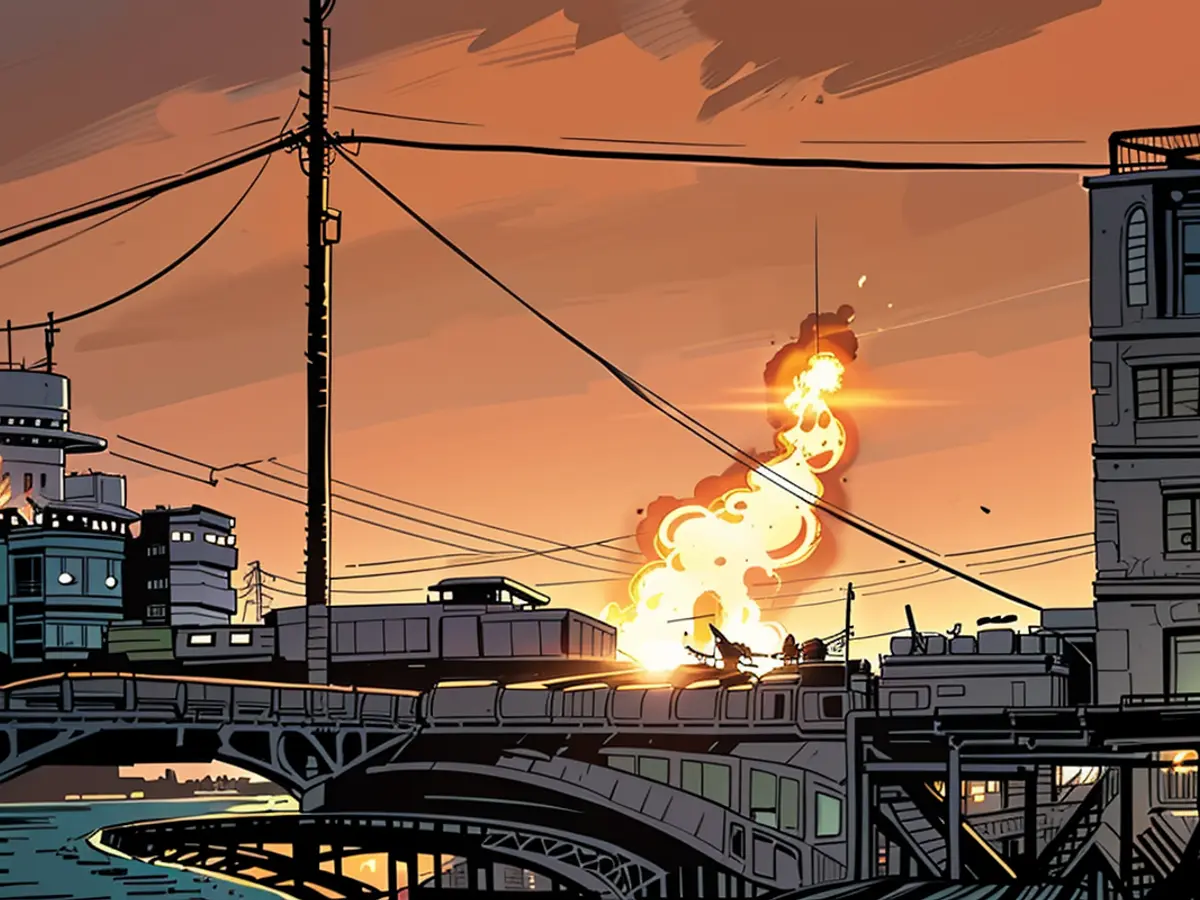Three dead in Israeli attack on Hodeidah, Huthis-controlled Red Sea port
The air raids should be a reaction "to hundreds of attacks" by rebels against Israel in the past few months, stated the Israeli army. Experts estimate that these are the first attacks by Israel claimed against the approximately 2000 kilometer distant Yemen.
"The fire that is currently burning in Hodeida can be seen throughout the Near East, and its significance is clear", declared Israeli Defense Minister Joav Gallant. "The blood of Israeli citizens has a price", he emphasized. "We have made this clear in Lebanon, in Gaza, in Yemen, and at other places - if they dare to attack us, the result will be the same."
Prime Minister Benjamin Netanyahu also emphasized in a television address: "Anyone who causes us harm will pay a very high price for their aggression." Israel will defend itself "with all means."
In the night from Friday to Saturday, a drone attack by the Houthis on Tel Aviv resulted in a death. Gallant had threatened retaliation. The militia had already attacked Israel more than 200 times - now, since they had caused damage to an Israeli for the first time, Israel had attacked, Gallant stated on Saturday.
Army spokesperson Daniel Hagari said that the Houthi militia uses the port in Hodeida "as the main logistics route for the transfer of Iranian weapons." This also applies to the drone used in the attack on Tel Aviv.
Israeli Foreign Minister Israel Katz declared that the attack in Yemen was also a warning to Iran. The Israeli military had "dealt a heavy blow to the terrorist branch of Iran in Yemen" today, he stated. Katz called on the international community to "maximize sanctions" against Iran.
In Hodeida, after the air raids, there were strong explosions, massive fires broke out, and over the city there was a huge smoke cloud. The Houthis-controlled Health Ministry stated that most of the wounded had "severe burns."
Israel will "pay the price" for its attacks in Yemen, declared Mohammed Al-Buchaiti, a member of the Huthi Politburo. The high-ranking Huthi representative Mohammed Abdelsalam condemned "Israel's brutal aggression." In his opinion, the attack targeted "fuel tanks and a power plant" in Hodeida, "to put pressure on Yemen," so that it would withdraw its support for the Palestinians. The Oil Ministry stated that there were "large and sufficient oil reserve stocks."
The Shiite Huthi rebels, who are supported by Iran and control large parts of the Yemeni coast on the Red Sea, have been attacking ships in the Red Sea and the Gulf of Aden since November. With their attacks on cargo ships that approach Israeli ports, they want to support the Palestinians in the conflict between Israel and the radical Islamic Hamas in the Gaza Strip.
Since the beginning of the year, British and US military forces have been attacking Houthi positions in Yemen regularly to destroy their military capabilities.
The USA declared on Saturday that they had not been involved in the Israeli air raids in Yemen. "We have not coordinated or supported the Israeli air raids", said a spokesperson for the National Security Council of the USA.
Saudi Arabia also distanced itself from the attacks. The spokesperson of the Defense Ministry stated that Saudi Arabia had "no connections to or involvement in" the shelling of Hodeida. Its country would not allow anyone to enter its airspace, emphasized Brigadier General Turki al-Maliki.
Hodeidah is a significant entry harbor for imports and international humanitarian aid deliveries to the areas controlled by the Huthis in Yemen. During the long-running civil war between the Huthis and the internationally recognized and Saudi-supported government, the seaport has been largely spared.
- The Israeli army cited hundreds of attacks by rebels as the reason for the planned air raids, primarily targeting Israel from Yemen.
- Gallant referred to the ongoing conflict in Hodeida and its impact on the region, emphasizing Israel's response to attacks against its citizens.
- Netanyahu reiterated Israel's commitment to defend itself against any aggression, regardless of the location.
- The drone attack by the Houthis on Tel Aviv resulted in a fatality, prompting threats of retaliation from Israeli officials.
- Hagari accused the Houthi militia of using the Hodeida port as a main logistics route for transferring Iranian weapons, including the drone used in the Tel Aviv attack.
- Katz used the incident in Yemen to issue a warning to Iran, urging increased international sanctions against the country.
- The Houthi-controlled Health Ministry reported severe burn injuries among the wounded in Hodeida following the Israeli air raids.
- Al-Buchaiti, a Huthi Politburo member, condemned Israel's actions and warned of consequences for its attacks in Yemen.
- The Huthi rebels, supported by Iran, have been attacking ships in the Red Sea and Gulf of Aden since November, aiming to support the Palestinians in the Gaza Strip conflict with Israel.







